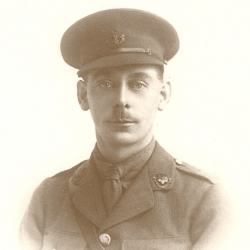Charles Earsham Cooke was born in Nottingham on June 22, 1896 and named after his paternal grandfather. To family and friends he was known simply as “Earsham”.
By 1901 the family had moved to Pontefract and Earsham’s father, Frederick William Cooke, was running W.J. Robson & Co Ltd, Maltsters. Earsham had a younger brother, Philip Brentnall Cooke, and a younger sister, Gladys Muriel Cooke, and they lived with their mother, Emma Louise Cooke (nee Brentnall), and father in a large house with three servants.
Earsham was educated at Marlborough College which he attended from September 1910 to July 1913. He was the 1913 Lightweight boxing champion and represented his house at cricket and rugby. After he left school he was employed in the family business and in such capacity may have sold malt to Thomas Grimshaw Hyde‘s family brewery and thus come to know him before military service.
On the 15th August 1914, on the basis of being a former cadet in the Officer Training Corps at Marlborough, he was awarded a probationary commission of 2nd Lieutenant in the 3rd (Reserve) Battalion York and Lancaster Regiment. The York and Lancaster Regiment having their headquarters at Pontefract Barracks, Pontefract and therefore his “local” Regiment. However, in the same edition of the London Gazette it was announced that he had become a 2nd Lieutenant in the 1/9th Battalion Manchester Regiment, effective September 2, 1914.
He joined the Battalion while they were at Chesham Fold Camp, Bury and sailed with them to Egypt in September 1914 serving with them there throughout their training and preparations for action. He landed with the 1/9th in Gallipoli on May 9, 1915 as a platoon commander in “A” Company.
On the 8th August the battalion went into the trenches, “A” and “B” Companies with the (125th) Fusilier Brigade, and “C” and “D” Companies with the (127th) Manchester Brigade. Lt. Oliver Jepson Sutton took two platoons of “A” company up to the firing line and was almost immediately wounded. Reinforcements were called for and so Lt. Forshaw and Lt. Cooke took two platoons of A” Company to the firing line. 40 hours of intense fighting at close quarters followed with the Manchesters separated from the Turks at times by only a parapet. “A” Company under Lieutenants Forshaw and Cooke held the position thus saving the entire sector from being retaken by the Turks. Lt. Forshaw stayed at his position for the entire period, killing 3 Turks with his revolver, and personally throwing a large number of the 800 bombs used in the action.
Lt. William Thomas Forshaw was awarded the Victoria Cross and Lieutenant Charles Earsham Cooke was awarded the Military Cross. Both also being mentioned in the despatches of General Sir Ian Hamilton.
On August 18 he left the battalion for Imbros on a GHQ Escort with 25 men. But shortly after arriving there he became sick and on September 5th, he was admitted to hospital. He was treated for Jaundice and quickly evacuated to Malta where he was admitted to the “Blue Sisters Hospital” on September 10, 1915. A few days later, on September 14th he was embarked upon the Hospital Ship Massilia and repatriated back to the UK, arriving at Southampton on September 22nd, suffering from enteric fever.
In the UK he was allowed to recover at home until January 21, 1916 when he was ordered to join the 3rd (Reserve) Battalion at Codford. Here he was put on light duty and on March 23 was passed fit enough to return to full duty. A month later he was ordered to rejoin the battalion in Egypt and embarked the Ivernia at Devonport on April 23, 1916.
He rejoined the battalion in Egypt on June 3, 1916 and was promoted to temporary Lieutenant on August 27, 1916. The only other mention of him in Egypt after that is returning from a course of instruction in Cairo, in late October and taking two days leave in Cairo from February 20-21, 1917.
He sailed with the 1/9th to France, landing on March 11, 1917, and is noted as being a platoon commander on April 22, 1917 when the Battalion was in Epehy. On the evening of May 6th and into the early morning of May 7th “B” Company, under Major Howorth, was responsible for carrying out the following special order:
Two small posts are to be established on either side of the road running from locality b. to QUENNEMONT FARM, one on either side of the road, and joined up. This should be undertaken as a very minor operation, with only sufficient men to dig a rifle pit on each side and then connect up. The object should be to advance these posts a short distance every night without attracting the enemy’s attention; and connect them up from behind with a communication trench.
Lt. Cooke commanded the party and they were met with heavy resistance from German machine guns resulting in many casualties, prompting several acts of heroism bringing wounded men in under fire. Lt. Cooke was wounded and evacuated to Hospital in Rouen where he later died from his wounds on May 24, 1917. Lieutenant Charles Earsham Cooke, M.C. was 20 years old.
He is buried in the Commonwealth War Grave at St Sever, Rouen and commemorated on the:
- Ashton-Under-Lyne Civic Memorial.
- Leeds Corn Exchange Memorial.
- Marlborough College Roll of Honour.

